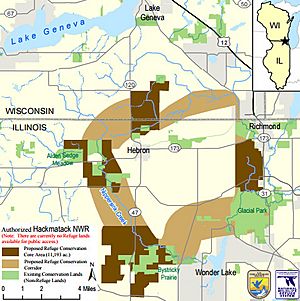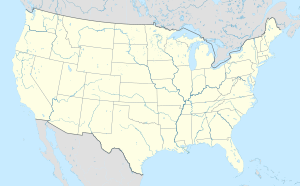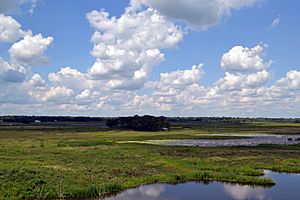Hackmatack National Wildlife Refuge facts for kids
Quick facts for kids Hackmatack National Wildlife Refuge |
|
|---|---|
|
IUCN Category IV (Habitat/Species Management Area)
|
|

Boundaries of the Hackmatack National Wildlife Refuge
|
|
| Location | McHenry County, Illinois, and Walworth County, Wisconsin, United States |
| Area | 11,200 acres (45 km2) |
| Established | 2012 |
| Governing body | U.S. Fish and Wildlife Service |
| Website | Hackmatack National Wildlife Refuge |
The Hackmatack National Wildlife Refuge is a special natural area in the United States. It's located in parts of McHenry County, Illinois, and Walworth County, Wisconsin, near the big cities of Chicago and Milwaukee. This refuge protects important natural places like tallgrass prairies, wetlands, and oak savannas (open woodlands). It's managed by the United States Fish and Wildlife Service (USFWS), which works to protect wildlife and their homes.
The Hackmatack Refuge is made up of different pieces of land that are not all connected. It covers about 11,200 acres (45.3 km²) of land. Most of this land (85%) is in Illinois, and the rest (15%) is in Wisconsin. This refuge adds to about 23,000 acres of land already protected for public use or conservation.
The name Hackmatack comes from an old Algonquin word. It refers to the American tamarack tree, a type of conifer that used to be very common in the wet areas of this region. The Potawatomi tribe, who lived here for a long time, used this word. They used the land for fishing, hunting, and gathering plants for food and medicine.
Many different kinds of animals live in the Hackmatack area. There are 109 species that are either threatened or endangered. This means they are at risk of disappearing forever. Forty-nine of these species are birds. One example of an endangered animal found here is the Blanding's turtle.
History of Hackmatack Lands
For many years, the Hackmatack wetlands were home to the Potawatomi tribe of Native Americans. They used these lands for important activities like fishing and hunting waterfowl (birds that live near water). They also gathered many plants for food and medicine from the area.
As more people moved into the area in the 1900s, many of these wetlands were changed. Some were drained to build homes and other developments. However, some special places, like the Volo Bog State Natural Area, were saved and protected.
Protecting the Refuge Today
In October 2010, the USFWS held meetings in Illinois and Wisconsin. They wanted to talk about their plans for creating the Hackmatack National Wildlife Refuge. They also asked for ideas and opinions from the public in 2011.
After listening to everyone's comments, the USFWS officially approved the plan for the refuge in August 2012. The refuge becomes official when the government buys or receives donations of land. This can mean owning the land completely or getting a special agreement called a conservation easement. Buying land depends on approval and money from the U.S. Congress.
In February 2013, the State of Illinois bought the first piece of land for the new refuge. It was a 72-acre plot in northern McHenry County. This purchase helped make the new Hackmatack National Wildlife Refuge a reality.
 | James Van Der Zee |
 | Alma Thomas |
 | Ellis Wilson |
 | Margaret Taylor-Burroughs |



